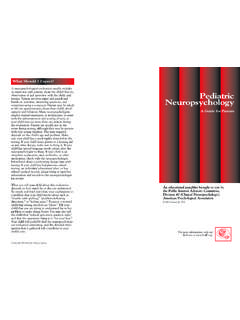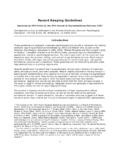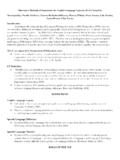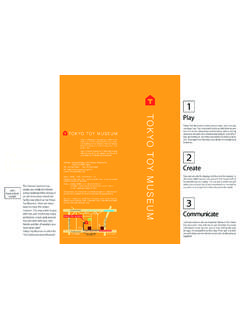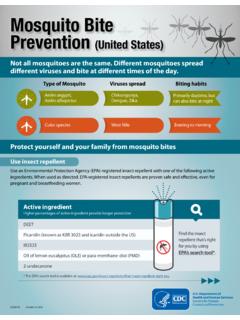Transcription of Clinical Neuropsychology - div40.org
1 ClinicalNeuropsychologyA Guide for Patients and Their FamiliesAn educational pamphlet brought to you by the Public Interest Advisory Committee, Division 40 ( Clinical Neuropsychology ),American Psychological Association 2001 Division 40, APAFor more information, visit ourWeb site at neuropsychological evaluation usually consists of an interview and testing. During theinterview, information that is important for theneuropsychologist to consider will be will be asked about your symptoms, med-ical history, medications, and other importantfactors. Testing involves taking paper-and-pencil or computerized tests and answeringquestions. The time required depends on theproblem being assessed. In general, severalhours are needed to assess the many skillsinvolved in processing information.
2 Some testswill be easy while others will be more most important thing is try your glasses or hearing aids if you use to rest and relax before your will probably find testing interesting, andthe detailed information that is gathered willcontribute to your Should I Expect? Test results can be used to plan treatmentsthat use strengths to compensate for weaknesses. The results help to identify whattarget problems to work on and which strategies to use. For example, the results canhelp to plan and monitor rehabilitation or tofollow the recovery of skills after a stroke ortraumatic brain injury. Studies have shown how scores on specifictests relate to everyday functional skills, suchas managing money, driving, or readiness toreturn to work.
3 Your results will help yourdoctors understand what problems you mayhave in everyday life. This will help guideplanning for assistance or by APA Editorial and Design ServicesClinical Neuropsychology is a specialty profession that focuses on brain Clinical neuropsychologist is a licensed psychologist with expertise in how behaviorand skills are related to brain structures andsystems. In Clinical Neuropsychology , brainfunction is evaluated by objectively testingmemory and thinking skills. A very detailedassessment of abilities is done, and the pattern of strengths and weaknesses is used inimportant health care areas, such as diagnosis and treatment planning. The Clinical neuropsychologist conducts the evaluation and makes recommendations.
4 Heor she may also provide treatment, such ascognitive rehabilitation, behavior manage-ment, or evaluations are request-ed specifically to help your doctors andother professionals understand how the dif-ferent areas and systems of the brain areworking. Testing is usually recommendedwhen there are symptoms or complaintsinvolving memory or thinking. This may besignaled by a change in concentration,organization, reasoning, memory, language,perception, coordination, or change may be due to any of a numberof medical, neurological, psychological, orgenetic causes. Testing will be helpful inunderstanding your specific typical neuropsychological evaluation willinvolve assessment of the following: General intellect Higher level executive skills ( , sequencing, reasoning, problem solving) Attention and concentration Learning and memory Language Visual spatial skills ( , perception) Motor and sensory skills Mood and personalitySome abilities may be measured in more detailthan others, depending on your test scores will be compared to scoresfrom people who are like you in importantways.
5 By using database scores from largegroups of healthy people for comparison, theneuropsychologist can judge whether or notyour scores are normal for your age and educational background. The pattern of yourown test scores will also be reviewed to estimate whether or not there has been achange in certain abilities. How you go aboutsolving the various problems and answeringquestions during the examination will also benoted. Using these methods, your strengthsand weaknesses can be results can be used to understand yoursituation in a number of ways. Testing can identify weaknesses in specificareas. It is very sensitive to mild memoryand thinking problems that might not beobvious in other ways. When problems arevery mild, testing may be the only way todetect them.
6 For example, testing can helpdetermine whether memory changes arenormal age-related changes or if they reflecta neurological disorder. Testing might alsobe used to identify problems related to med-ical conditions that can affect memory andthinking, such as diabetes, metabolic orinfectious diseases, or alcoholism. Test results can also be used to help differentiate among illnesses, which is impor-tant because appropriate treatment dependson accurate diagnosis. Different illnessesresult in different patterns of strengths andweaknesses on testing. Therefore, the resultscan be helpful in determining which areas ofthe brain might be involved and what illnessmight be operating. For instance, testing canhelp to differentiate among Alzheimer s dis-ease, stroke, and depression.
7 Your physicianwill use this information along with theresults of other tests, such as brain imagingand blood tests, to come to the mostinformed diagnosis possible. Sometimes testing is used to establish a baseline, or document a person s skillsbefore there is any problem. In this way, later changes can be measured very Is Clinical Neuropsychology ?Why Have I Been Referred?What Is Assessed? How Are Test Scores Used To Understand My Specific Situation?What Will the Results Tell Me?
